- Home
- Peter F. Hamilton
A Night Without Stars Page 4
A Night Without Stars Read online
Page 4
The voice was soft, but anxious. Almost everyone in the crypt looked at Javier. The big man was staring at Fergus.
‘We can do this,’ the ANAdroid said. ‘Even Kysandra. She might look like an angel, but she can be quite the warrior when she needs to be.’
Kysandra winked at Javier.
The terminus shifted, coming down to ground level, revealing a level expanse of rock-strewn desert sand, with dunes rising high up ahead.
‘Terminus is in the lee of a dune,’ Laura said. ‘No sensor coverage. Picking up some low-level radiation out there.’
‘The exhaust,’ Marek said. ‘We believe they used nuclear gas-core rockets.’
‘That was my conclusion, too.’
‘Okay, my armour can cope with that. Let me through.’
Laura sent a code to the gateway, and the force field became porous. Marek took it at a run, jumping through onto the grainy sand beyond.
‘Clear!’
Laura shifted the terminus to spaceship two. This time the ground was covered in scrub bushes, but all of them had wilted. Some were smouldering. Then the terminus jittered, shifting up several metres then sliding sideways. Laura sent a flurry of corrections through her u-shadow, and it stabilized again. She checked her exovision schematics.
‘It’s holding,’ she said.
Fergus sprinted through. He ducked down behind some boulders as the terminus shifted away, but not before they all saw his coverall transform to the same colour as the rocks. It would be stealthed, too, Laura knew, keeping him hidden from any sensors the invaders could deploy.
‘Then there was one,’ Kysandra said quietly as the terminus settled a kilometre from number eight.
‘Good luck,’ Javier said.
She turned to Slvasta, her red hair flowing over her shoulders, and took her time placing a wide-brimmed leather hat on her head. ‘I won’t abandon these people you oppress,’ she said. ‘I will always be here to help them. But never you.’ With that she walked calmly through the gateway, taking the cylinder off her shoulder as she went.
‘Arrogant bitch,’ Slvasta grunted – but not before Laura had shifted the wormhole terminus once again.
‘Don’t underestimate her,’ Laura said without looking at him. ‘And remember, I have exactly the same opinion of you.’
Nobody said anything; all the officers were suddenly busy studying their maps or clipboards.
‘How are we doing with the second invasion fleet?’ Laura asked.
‘Estimated eleven minutes until landing,’ the Space Vigilance Office liaison officer said. ‘They’re entering the chemosphere.’
Laura reconfigured the wormhole, opening the terminus above Tothland – an island in the Sibal Ocean not big enough to qualify as a continent. Seven crimson patches of light shone bright above the night-time landmass as the spaceships aerobraked. Her u-shadow analysed the positions and trajectories. Their rocket exhausts started to fire, sending pale splinters of luminescence shimmering across the hidden mountains far below.
‘Weapons master,’ Laura said. ‘Please prepare the bombs.’ Three keys were hanging on slim chains round her neck. She passed them to him.
Slvasta handed over his three keys as well. The weapons master opened the control hatch on the first of the three atomic bombs and put the keys in their twin sockets. Laura was almost tempted to activate her biononics force-field function, but if the damn thing did go off, a force field wouldn’t protect her – not at this distance. The keys were turned simultaneously.
‘Bomb one activated,’ the weapons master announced solemnly.
Laura’s u-shadow performed a quick calculation as she walked over to the crude metal cylinder, and she set the timer for a hundred seconds. She flicked the red switch, trying not to flinch. Three lights shone red, and she closed the little hatch.
Five Manhattan Project technicians wheeled the bomb into the middle of the crypt, directly in front of the gateway.
‘Stand by,’ she told them. The terminus shifted again, down into the stratosphere, close to the trajectories of three invaders. Silver light shone through, coming from somewhere above the opening. ‘Go!’
The technicians were all young and fit, chosen for their strength. They pushed hard, building speed quickly across the ancient stone-paved floor. The bomb weighed nearly half a tonne, but it was moving fast when the trolley reached the gateway, and they gave it a final shove. Laura’s u-shadow immediately moved the terminus away.
Theoretically, the bomb had a yield of forty-three kilotons. It would have been useless deployed in space against the invaders. For one, she couldn’t hope to open the gateway terminus close to an accelerating spaceship and match velocity accurately enough. And second, even if they could deploy the bomb close enough, a nuclear explosion in a vacuum was unlikely to be effective. There would be no blast wave. Yes, the spaceship would suffer the radiation spike, and the electromagnetic pulse, but she couldn’t be sure that would kill it.
An atmospheric strike, however, was different. The ships were vulnerable during their descent phase, and it was the blast wave which would cause the real damage. Supersonic winds smashing into the spaceships in tandem with the radiation deluge and the electromagnetic pulse knocking out unprotected electronics and power systems . . .
With only three bombs it was their best chance.
‘Bomb two activated,’ the weapons master said.
She set the timer for a minute. The short interval was used to confirm the location of the invader’s ships. Looking down from four hundred kilometres above Bienvenido, they saw proof that the first bomb had exploded successfully, which brought a swift cheer round the crypt. The detonation flare was spent; now there was only a seething ball of star-hot plasma, cloaked in a shroud of ruined air. Tothland was fully illuminated by the devilish purple-white glare. Her u-shadow could just distinguish four spaceships still descending within the chaotic atmosphere.
The terminus switched position again. Bomb two was shoved through, six kilometres above the ground.
Bomb number three was deployed at a mere two and a half kilometres of altitude.
Please work, she prayed as the five determined technicians let go of the trolley handle. It seemed to be the mantra she lived her life with these days. Everything she’d done since she landed had been nick-of-time kludges in the face of adversity. Every time she thought she was making progress, something would come along to challenge her satisfaction.
In a bizarre way she almost welcomed this invasion. If they destroyed the Prime, it would buy Bienvenido time. The planet’s society might just start to change as newer technologies began to make life easier. She might live to see the Commonwealth once more.
Unlikely.
Not that there was anyone left for her in the Commonwealth, anyway. The majority of her friends and family had all been on the colony fleet. But it has to be better than this.
The terminus opened again at five hundred kilometres above the radiation-saturated zone. Everyone watched anxiously as the three malevolent swirls of energy staining the air slowly subsided. Massive firestorms had broken out across Tothland as vegetation vaporized and entire forests ignited. Broiling hurricanes raced outwards, bringing ruin with them. There was no sign of any spaceship rocket exhausts.
‘Did we do it?’ Slvasta asked in trepidation.
‘I think so,’ she said. Her enhanced retinas scanned the area where the ships had been, unable to detect anything but the billowing ion haze.
‘Thank you.’
She nodded acknowledgement. He’d actually meant it.
‘Do we open the gateway back to Fanrith and bring them back?’
‘No. Kysandra said they would find their own way home.’
I see.
‘So how do we know if they’ve been successful?’ Yannrith asked.
Always the suspicious one, Laura thought. ‘You need to send the forward scouts into the landing zone to confirm the ships were destroyed. But Kysandra will have done the job. T
rust me.’ I haven’t told you half of the things biononics are capable of.
‘All right.’ Slvasta turned to one of the regimental colonels. ‘Send the scouts in.’
‘Sir.’ The colonel picked up a telephone and started talking into it.
‘Time to finish this,’ Laura said. ‘Let’s get the floaters in here.’
‘Yes, ma’am,’ the weapons master acknowledged.
Slvasta and Javier exchanged a glance.
‘Are you sure about this?’ the political adviser asked.
‘I’ve never been more sure of anything,’ Laura told him solemnly. ‘If we don’t eliminate Ursell, the Prime will just keep on coming. Once they confirm how vulnerable Bienvenido is, it won’t be sixteen ships they send next, it’ll be sixteen thousand.’
‘I thought you said Ursell was ruined?’ Slvasta asked.
‘It is.’
‘So surely the ships we’ve just defeated are all they can send?’
‘No,’ Laura told him firmly. ‘What they’ve sent is just what they could put together in a hurry. The Prime that are left back on Ursell will expend whatever is left of their resources to transfer themselves here. They know they can survive and expand again on Bienvenido.’
‘But the Fallers—’ Javier began.
‘What? They’ll save us?’ she asked scornfully. ‘Even they can’t stand against the Prime. No, this is something that must be done.’
‘All right. Just . . . be careful,’ Slvasta said.
‘I always am.’
They continued to look through the gateway as the bombs’ devastation slowly cleared, the devil’s light draining from the sky above Tothland. The firestorms raged below them, pumping dense smoke into the tormented air. Then the next two trolleys were being wheeled into the crypt by the same technicians who’d delivered the atom bombs.
The floaters were another of Vermillion’s cargo which had lain undisturbed since the landing. Like the gateways, floaters also generated wormholes, but they were intended to support the new colony’s burgeoning manufacturing industry rather than provide transport. Slightly smaller than the CST BC5800d2s, they were designed to be dropped into a gas giant’s atmosphere, where their force fields would expand, acting as a buoyancy system so their altitude could be selected with a good level of accuracy. That was necessary in a gas giant, where the atmospheric density varied the chemical composition enormously, from almost pure hydrogen at the uppermost levels to complex hydrocarbons at the bottom. When the floater reached the required strata, its wormhole would open directly into a refinery, and a near-infinite supply of hydrocarbons would rush in, ready for conversion into whatever products the burgeoning colony needed.
The first time she saw them still in their protective transit shells, she’d thought she could use them to assist Bienvenido’s petrochemical era, providing combustion engine fuel without the need for oil wells and shale mines. Then she’d hesitated, wondering if she could skip that entire stage by going directly to fusion and high-density batteries – and cut out decades of pollution. It was a good problem to have, taking her mind off the Faller threat and Slvasta’s despicable regime.
The weapons technicians had to turn the floaters sideways to get them through the crypt’s arched doorway. They were cylinders four metres in diameter and two deep, with a concave centre on one side. The casing was a grey metalloceramic mottled with turquoise blemishes, as if it was a living carapace. They’d been relatively easy to restore, with less component degradation than the gateways. She supposed that was due to the tough environment they were designed to work in.
Her u-shadow established a link to both of them, and interrogated their smartnets to run a final systems check. Like the CST BC5800d2, they were powered by a direct mass-energy converter that could be fed by the superpressurized atmosphere they were immersed in. Exovision displays showed her they were fully functional.
She stared at them as the trolleys came to rest. She’d done good work, aided by information from the ANAdroids. So no reason to delay, then. Bollocks.
‘All right then,’ she announced. ‘Let’s do this.’
‘And there’s no other way?’ Javier asked.
‘No.’
‘You would kill an entire world?’
‘Sonny, it’s us or them.’ Again.
Slvasta held up a hand and gave Javier a sharp glance. ‘Laura knows what must be done. Without her . . .’ He smiled ruefully. ‘It’s just the risk. Please allow me to send some Marines through with you’
‘They wouldn’t be any help,’ she said. ‘But thanks anyway.’ Her u-shadow sent a new series of instructions into the CST BC5800d2.
The terminus shifted again. Exovision displays showed her the gateway’s increased power consumption as the wormhole extended its range by eighty million kilometres. This time, the terminus judder was more pronounced.
A wan heliotrope light shone through the gateway, but there was nothing to see, just a haze. The terminus had opened deep inside Valatare’s atmosphere. Laura studied her exovision displays as 3D graphics fluctuated, with amber caution graphics streaming in. The force field was being subjected to a huge pressure. ‘Odd,’ she muttered.
‘Something wrong?’ Slvasta asked. There was an edge to his voice – not anger for once, but fear.
‘Not specifically.’ Her u-shadow sent a fresh batch of instructions to the gateway, and the terminus shifted. She monitored the pressure against the gateway’s force field, which was reducing rapidly. Then the haze cleared. The terminus had risen out of a cloud layer. It was as if they were looking out across an infinite cyan sky, roofed by another unbroken cloud sheet tens of kilometres above them. Mammoth hurricane-whorls chased through the gulf at colossal speed. Phenomenal lightning bolts snapped between them, rivalling solar flares in power.
Valatare was the sole gas giant orbiting this lost sun, ten million kilometres further out than Bienvenido. At ninety-seven thousand kilometres in diameter, it was considerably smaller than Jupiter, but still massive. Whenever it was in conjunction, it created storms and tides the like of which Bienvenido had never known before.
Laura frowned at the readings she was getting from the gateway – not the force field, but the wormhole itself. ‘That’s not right.’
‘What is it?’ Slvasta asked. ‘Are there more aliens?’
‘It’s not that,’ she assured him and everyone else in the crypt. Aliens were now Bienvenido’s ultimate nightmare. They had a justifiable collective paranoia of monsters swooping down on their planet, she acknowledged.
In truth she’d been worried by what might be lurking in Valatare’s atmosphere. The theory she and the ANAdroids had come up with was that the Void used this lonely star as a place to banish the planet of any species who defied it in some way – a theory confirmed by the Vatni, who claimed to have seen Ursell emerge from nowhere over a thousand years ago.
The Vatni themselves, though amenable to strategic deals with humans, were stubborn to the extreme, refusing to have their nature consumed by whatever malevolent intelligence lay at the heart of the Void. Ursell was a semi-habitable wasteland, ruined by a nuclear war – so typical of the Prime, whose existence was one of constant belligerence.
Macule was in an even worse state than Ursell – whatever species used to live there must have wiped themselves out in a ferocious nuclear exchange millennia ago. Odd Trub, a featureless barren planet with a thin atmosphere and a dozen tiny moons (the only ones in the system). She’d never had the time to work out its enigmatic presence. Asdil, orbiting much further out than Valatare, and completely frigid under its nitrogen-methane atmosphere. Laura didn’t know what kind of alien that could support; the Commonwealth had never found any cryolife, and there was no electromagnetic signal or thermal emissions signalling any kind of civilization. The same went for Fjernt, which was visually encouraging, with water oceans and twenty per cent landmass, but the atmosphere was nitrogen and carbon dioxide – no free oxygen. As it was unscathed by any conflict, Laura
liked to think its aliens had found their way back to wherever they’d come from. And if they can do it . . .
But from what she’d experienced so far, this isolated star system was turning out to be utterly lethal for humans.
‘Then what’s the problem? Javier asked.
‘It’s the gravity.’
‘The what?’
‘Valatare’s gravity. It’s wrong somehow. The gradient is steeper than it should be this close; that’s what threw the terminus emergence point off. The pressure is all wrong as well. It might be the density – that blue colour is from methane – but there’s not enough to . . . This is weird.’
‘Does that affect your plan?’
‘No.’ She locked the terminus coordinates, and looked over her shoulder at the technicians clustered round the first floater. A final activation signal from her u-shadow – confirmed by the floater’s smartnet – and she told them: ‘Go.’
They pushed hard, but the floater weighed a lot more than the atom bombs. It trundled slowly over the floor towards the gateway. Javier went over and added his considerable strength, soon followed by Yannrith, and then Slvasta. Several Air Force officers joined them until it resembled a rugby scrum piled up against the floater’s dark casing. The machine began to pick up speed.
‘Careful,’ she warned as the leading edge slipped through the force field. The bulk of it went through, and Valatare’s gravity took over, pulling sharply. Everyone let go and lurched back. The floater fell through and dropped away fast.
Laura stood close to the gateway so her link to the floater’s smartnet would be maintained. Secondary routines in her macro-cellular clusters monitored the telemetry, seeing a force field expand out around the tumbling cylinder, increasing its buoyancy. The rate it dropped began to slow, then it stopped twenty kilometres below the terminus – a dark speck buffeted by the winds. ‘Okay, that’s good. External pressure at the floater is thirty-three times Earth standard. That should do it.’
She suddenly realized that it was now. The inevitable moment had just crept up, which was maybe for the best. Laura knew she wasn’t the bravest person; her first encounter with Fallers had shown her that. But she’d accepted her fate then, so once again—‘Bring the second floater up, please,’ she said.

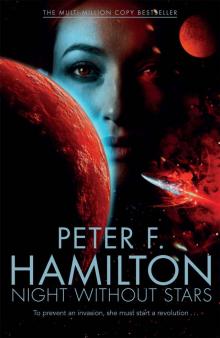 A Night Without Stars
A Night Without Stars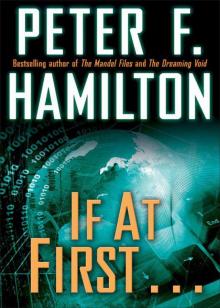 If at First . . .
If at First . . .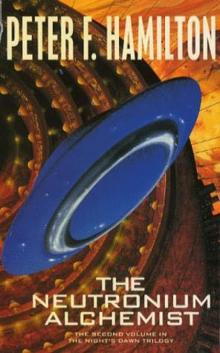 The Neutronium Alchemist
The Neutronium Alchemist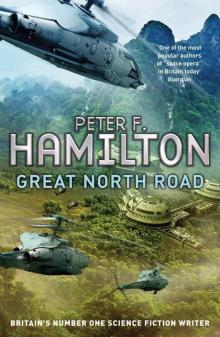 Great North Road
Great North Road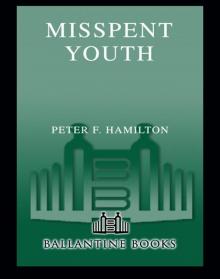 Misspent Youth
Misspent Youth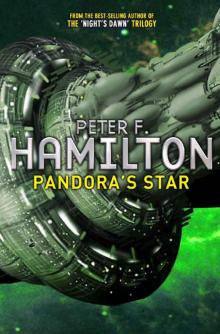 Pandora's Star
Pandora's Star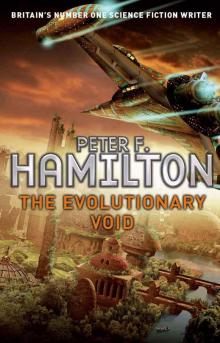 The Evolutionary Void
The Evolutionary Void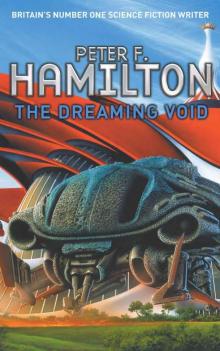 The Dreaming Void
The Dreaming Void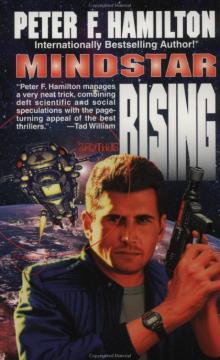 Mindstar Rising
Mindstar Rising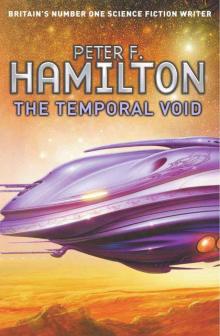 The Temporal Void
The Temporal Void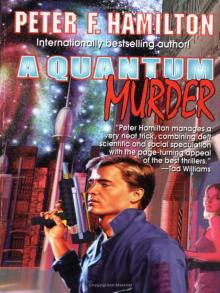 A Quantum Murder
A Quantum Murder The Hunting of the Princes
The Hunting of the Princes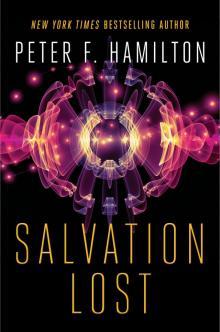 Salvation Lost
Salvation Lost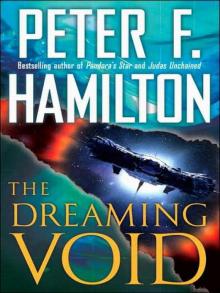 The Dreaming
The Dreaming Salvation
Salvation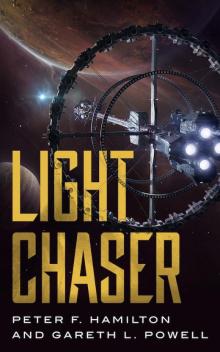 Light Chaser
Light Chaser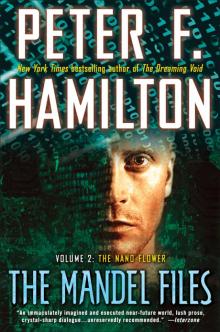 The Mandel Files, Volume 2: The Nano Flower
The Mandel Files, Volume 2: The Nano Flower![The Saints of Salvation [British Ed.] Read online](http://i1.bookreadfree.com/22/the_saints_of_salvation_british_ed__preview.jpg) The Saints of Salvation [British Ed.]
The Saints of Salvation [British Ed.]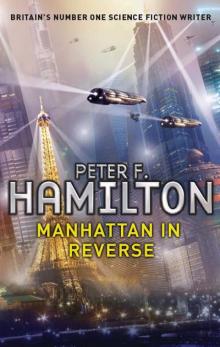 Manhattan in Reverse
Manhattan in Reverse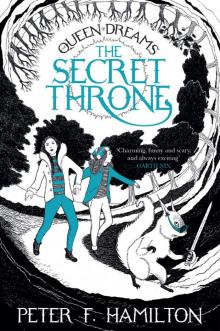 The Secret Throne
The Secret Throne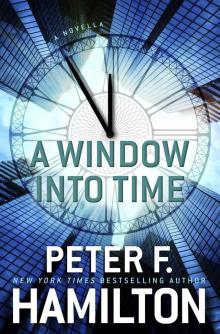 A Window Into Time
A Window Into Time A Second Chance at Eden
A Second Chance at Eden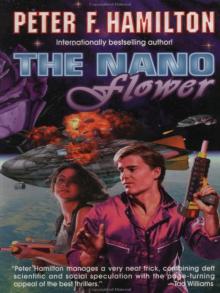 The Nano Flower
The Nano Flower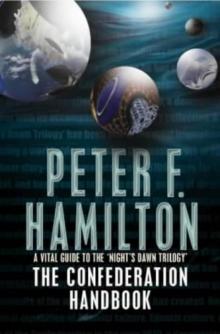 The Confederation Handbook
The Confederation Handbook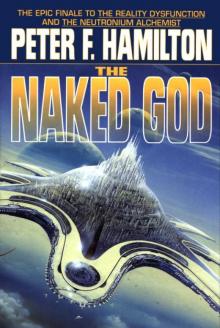 The Naked God
The Naked God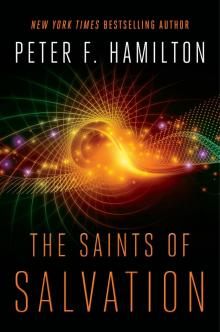 The Saints of Salvation
The Saints of Salvation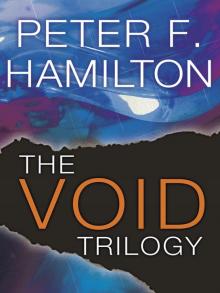 The Void Trilogy 3-Book Bundle
The Void Trilogy 3-Book Bundle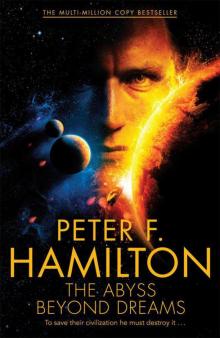 The Abyss Beyond Dreams
The Abyss Beyond Dreams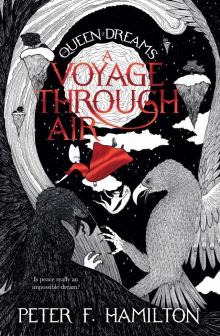 A Voyage Through Air
A Voyage Through Air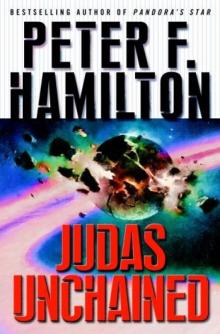 Judas Unchained
Judas Unchained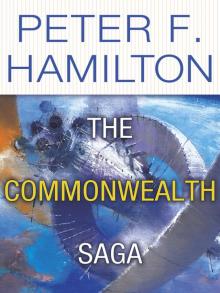 The Commonwealth Saga 2-Book Bundle
The Commonwealth Saga 2-Book Bundle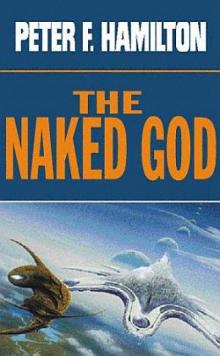 The Naked God - Flight nd-5
The Naked God - Flight nd-5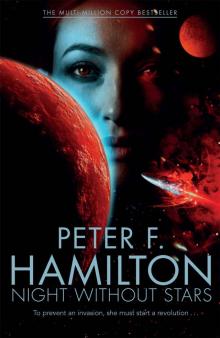 Night Without Stars (Chronicle of the Fallers Book 2)
Night Without Stars (Chronicle of the Fallers Book 2)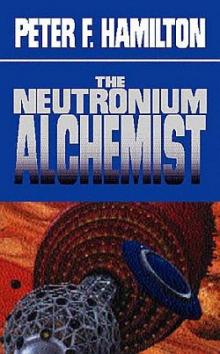 Neutronium Alchemist - Conflict nd-4
Neutronium Alchemist - Conflict nd-4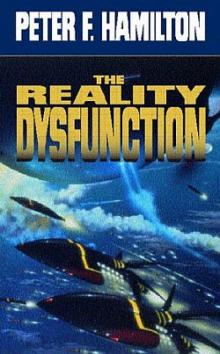 Reality Dysfunction - Expansion nd-2
Reality Dysfunction - Expansion nd-2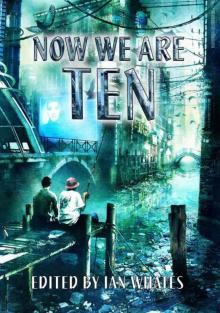 Now We Are Ten: Celebrating the First Ten Years of NewCon Press
Now We Are Ten: Celebrating the First Ten Years of NewCon Press Neutronium Alchemist - Consolidation nd-3
Neutronium Alchemist - Consolidation nd-3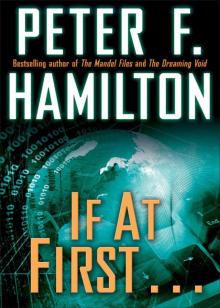 If at First . . . (Short Story)
If at First . . . (Short Story)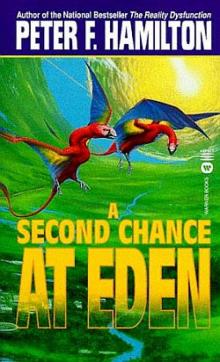 A Second Chance at Eden nd-7
A Second Chance at Eden nd-7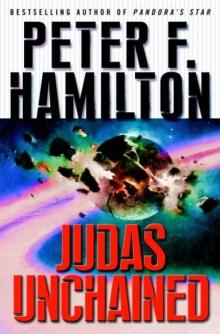 Judas Unchained cs-2
Judas Unchained cs-2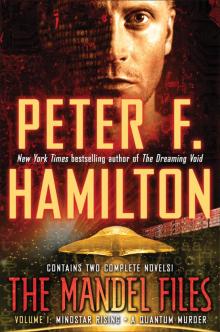 The Mandel Files, Volume 1
The Mandel Files, Volume 1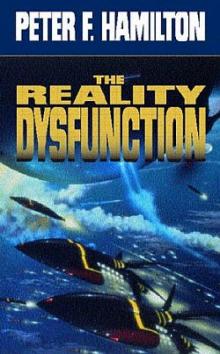 Reality Dysfunction — Emergence nd-1
Reality Dysfunction — Emergence nd-1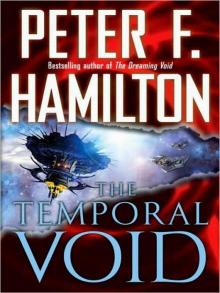 The Temporal Void (ARC)
The Temporal Void (ARC)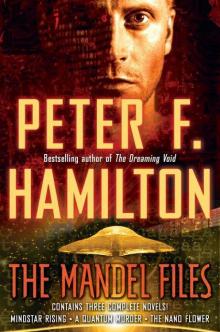 The Mandel Files
The Mandel Files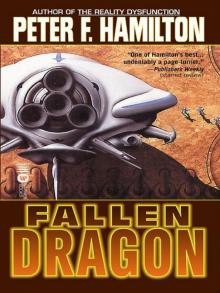 Fallen Fragon
Fallen Fragon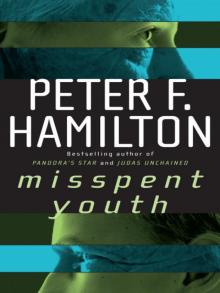 Misspent Youth (commonwealth saga)
Misspent Youth (commonwealth saga)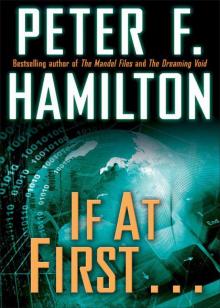 If at First...
If at First...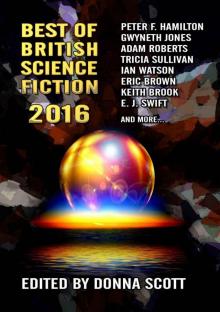 Best of British Science Fiction 2016
Best of British Science Fiction 2016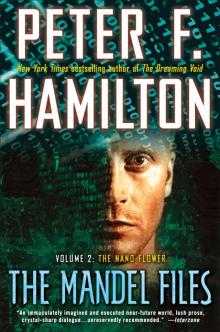 The Mandel Files, Volume 2
The Mandel Files, Volume 2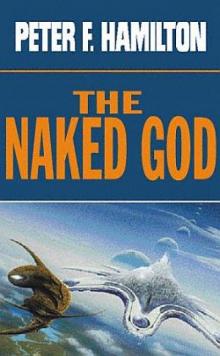 The Naked God - Faith nd-6
The Naked God - Faith nd-6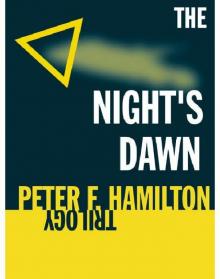 The Night's Dawn Trilogy
The Night's Dawn Trilogy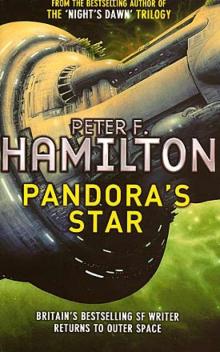 Pandora's Star cs-2
Pandora's Star cs-2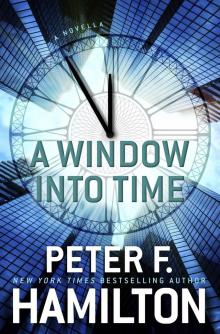 A Window into Time (Novella)
A Window into Time (Novella)